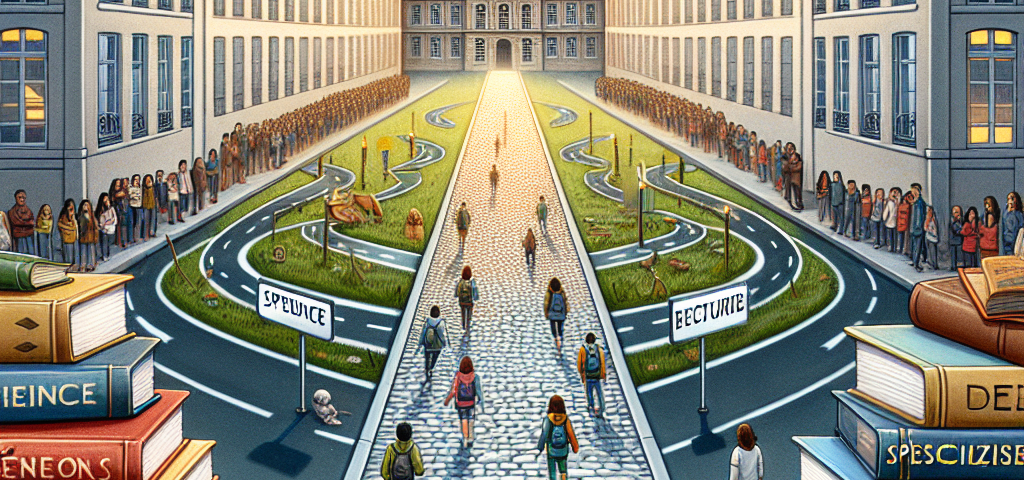
Diversity and Inclusion in French Secondary Education: Progress and Challenges
May 31, 2025
A Journey Through French: The Importance of Multisensory Learning in Primary Education
May 31, 2025
Navigating the French education system can be a pivotal moment for students and families alike. The transition from collège (middle school) to lycée (high school) marks a significant turning point, as students are faced with the decision of choosing a specialized track that aligns with their academic interests and career aspirations. This article delves into the various specialized tracks available in French secondary schools, their importance, and how to make an informed choice.
Understanding the French Secondary Education System
In France, secondary education encompasses two main stages: collèges for students aged 11 to 15 (grades 6 to 9) and lycées for students aged 15 to 18 (grades 10 to 12). At the end of their collège years, students take the Diplôme National du Brevet (DNB), which assesses their competencies across various subjects. Upon successful completion, they can choose one of the paths available in lycée, each offering a distinct trajectory for their future education or career.
Specialized Tracks in Lycée
French lycées offer three main types of specialized tracks:
1. General Baccalauréat
The General Baccalauréat is broadly aimed at students interested in pursuing higher education. It comprises three primary streams:
-
Literary (L): Focuses on literature, languages, philosophy, and social sciences. Ideal for students aspiring to fields like law, humanities, and creative arts.
-
Scientific (S): Centers on mathematics, physics, chemistry, and life sciences. This track is best suited for students aiming for careers in engineering, healthcare, or natural sciences.
- Economic and Social (ES): Combines economics, social sciences, and mathematics. It’s a great choice for those interested in social work, business, or political science.
2. Technological Baccalauréat
For students interested in a more hands-on approach, the Technological Baccalauréat provides a balance of theoretical knowledge and practical skills. It caters to a range of fields including:
-
STI2D (Sciences and Technologies of Industry and Sustainable Development): Geared towards students interested in engineering and technology.
-
STMG (Sciences and Technologies of Management and Administration): Focuses on business administration and management practices.
- STL (Sciences and Technologies of Laboratory): Aimed at those interested in laboratory sciences and experimentation.
Students choosing this path typically enter vocational training or continue into specialized higher education.
3. Vocational Baccalauréat
The Vocational Baccalauréat is designed for students who wish to enter the workforce directly after graduation or pursue further vocational training. This track emphasizes practical experience and skill development in specific fields like:
-
Hospitality and Catering
-
Construction and Building
- Health and Social Care
This pathway helps students acquire vital skills and prepares them for immediate employment.
Factors to Consider When Choosing a Track
1. Interests and Passions
Arguably the most important factor is interest. Students should reflect on their personal interests and strengths. Are they more drawn to creative tasks, scientific experimentation, or practical work? Exploring subjects that excite them can provide valuable insights into potential career paths.
2. Career Aspirations
Understanding where they envision themselves in the future can guide students in selecting the right track. Researching the educational requirements and job prospects associated with various fields can also inform their decisions.
3. Guidance and Support
It is essential for students to communicate openly with their parents, teachers, and career counselors. These stakeholders can offer advice, resources, and perspectives that may not be apparent through self-reflection alone. School information sessions and open houses can also provide critical insights into what each track entails.
4. Work Experience Opportunities
Some students may benefit from internships or work experience programs before making their choice. Gaining firsthand experience in a particular field can provide clarity and motivate them towards a specific path.
Conclusion
Choosing a specialized track in French secondary schools is a significant decision that can shape a student’s academic and professional future. While the array of options can seem overwhelming, taking the time to reflect on interests, career aspirations, and available support can lead to a more informed choice. The right educational path not only lays the foundation for future success but also fosters a lifelong passion for learning and growth. As such, both students and parents should embrace this transition as an opportunity for exploration and engagement in defining their educational journeys.

